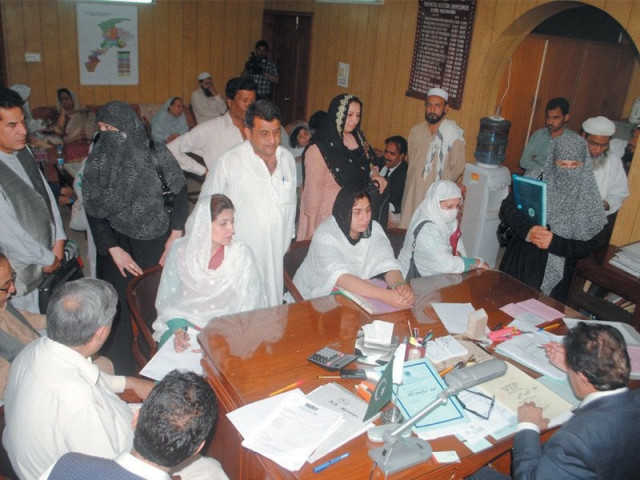Women in local govt crucial for enhancing national politics
Speakers argue on greater empowerment of women at the lowest elected govt level

Scrutiny process of women candidates under way at a provincial office of the Election Commission of Pakistan. PHOTO: MUHAMMAD IQBAL/EXPRESS
This was argued by speakers in a policy dialogue on “Women Leadership in Local Government”, organised by Blue Veins in collaboration with Bargad.
MPA Taj Mohmad said that “mere representation in local governments does not guarantee that women have any substantial influence over policy decisions, or that they will articulate women’s interests.”
Instead, he said that it depends on the “incentives provided to them as representatives, and it requires a conscious and deliberate action on the part of the women to make a difference. It also requires effective knowledge and understanding of how the system works.”
“Equal participation and representation of women in local decision-making processes is critical for prioritizing women’s practical needs and issues in local government agendas and for localising the Sustainable Development Goals (SDGs),” said Ayesha Bano, another provincial assembly lawmaker and a member of the Khyber-Pakhtunkhwa (K-p) Assembly Standing Committee on Local Government.
“Gender-balance in local governments can be an important step in helping to attain gender balance at the national levels,” she said.
“Decentralization arrangements can promote gender-equitable local level economic development and reduce poverty. There are opportunities to be exploited in enhancing women’s participation in local governance and their access to benefits from local development initiatives. There are also constraints to managed and addressed,” said Provincial Ombudsperson on Harassment of Women Rukhshanda Naz.
Qamar Naseem, a programme coordinator for Blue Veins said that “while the visibility of women in local government has increased, their numbers are still very low – both as administrators and as assembly members and counsellors.”
“The issue is not the numbers of women alone, but their self-knowledge, confidence, clarity of purpose, priorities, commitment and ability to skillfully present their perspectives,” he said, adding that women have to juggle multiple roles of being wives, mothers, daughters, community workers and income-generators which severely limits their time for community interaction and mobilization
“The under-representation of women at any level of governance and decision-making results in a democratic deficit,” argued MPA Asia Khattak.
Published in The Express Tribune, June 28th, 2019.













COMMENTS
Comments are moderated and generally will be posted if they are on-topic and not abusive.
For more information, please see our Comments FAQ